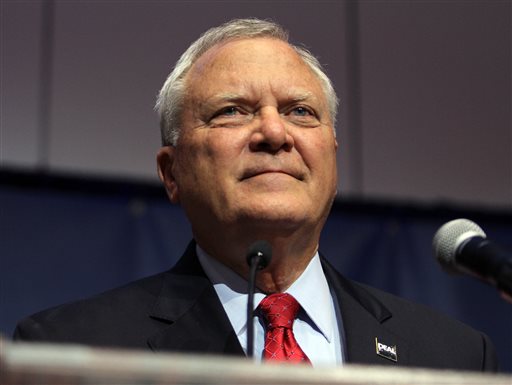MORE ELECTION COVERAGE• New era for abortion in Tennessee; voters open door for more regulation• Full voter guide results• GOP takes control of Senate, ending eight-year Democratic run• Republican incumbents easily take Tennessee's 3rd, 4th districts• Hamilton County cities vote to allow wine in grocery stores• Rogers defeats alleged sexual harasser Sharrock in Fort Oglethorpe contest• GOP sweeps governor's races; Wisconsin gives Walker 3rd win• Ballot measures: Oregon, D.C. voters OK use of pot
ATLANTA - Georgia Gov. Nathan Deal will serve a second term after overcoming a challenge from Democrat Jason Carter, a state senator from Atlanta and grandson of former President Jimmy Carter.
Businessman David Perdue also kept Georgia's open U.S. Senate seat in GOP hands, beating a challenge by Democrat Michelle Nunn on the strength of white voters in the reliably Republican state.
Democrats hoped Nunn, the centrist daughter of popular former Sen. Sam Nunn, would enable them to pick up a seat in an otherwise dismal midterm election.
But Perdue overcame repeated attacks on his business record by Nunn and outside groups. His chief argument to voters was that Nunn would be a rubber stamp for President Barack Obama and national Democrats including Senate Majority Leader Harry Reid.
"I think Georgia made it loud and clear tonight that we are going to stop the failed policies of President Obama and Sen. Harry Reid," Perdue said in his victory speech. Earlier Tuesday, he said "people who really love America" would decide the election.
Perdue won 55 percent of the vote to 43 percent for Nunn with 93 percent of precincts reporting.
Exit polling showed Nunn won more than half the female vote and the overwhelming majority of black votes, while Perdue won about 70 percent of white votes.
"We have reminded people of what a two-party system looks like,'" Nunn said while conceding defeat.
"At our best, we not only accept the electoral results, but we practice the art of bridge building and reconciliation, and so I offered David my strongest possible support as he works to unite Georgia and to build bridges across party lines," she said.
Perdue's outright victory avoids a predicted runoff election and helps cement a new Republican majority in the Senate.
Voters were already treated to 65,000 TV ads during the Senate primary and general election campaigns, a total spend of $42.5 million. Only North Carolina's Senate race saw more money spent on TV ads than Georgia, according to the Center for Public Integrity.
Unofficial returns on Tuesday showed Deal winning the governorship by a wide margin over Carter.
Deal, a former congressman, trumpeted the state's No. 1 rating by business publications and criminal justice reforms during the campaign. Republicans counted on the party's base to hold off Carter and to win Deal enough votes to prevent a runoff.
Deal also criticized Carter, who focused on education funding and the state's high unemployment rate, for being vague about how to pay for his promises.
Libertarian Andrew Hunt, the former CEO of an Atlanta nanotechnology firm, also was on Tuesday's ballot.
Deal told reporters just before polls closed that he was confident in a full-stop victory while touring the College Football Hall of Fame in Atlanta, where Georgia Republicans plan to watch vote totals come in.
"We all knew this was going to be a difficult election year," Deal said. "The demographics of our state have changed and are continuing to change. We have to adjust to that, but I think we had a message, hopefully we had a message people of this state accepted and understood."
Carter's supporters gathered to watch the returns at a hotel in downtown Atlanta, and his campaign chairman Michael Coles briefly addressed the crowd then told reporters that he's encouraged by how Carter is performing in some rural counties that Cole described as "not friendly territory" for Democrats.
"Jason can go to south Georgia and talk to farmers, and they know that he's telling them the truth because of his roots," Coles said, a reference to the Carter family's peanut farming legacy in Plains. Carter, 39, is former President Jimmy Carter's grandson.
The campaign is likely 72-year-old Deal's last after a career in Georgia's state Senate, the U.S. House of Representatives and his 2010 election as governor. He easily overcame two challengers in a spring primary, and then often found himself on the defensive during the general election.
Deal supporter Chip Faucette said he was happy with the governor's first term and voted for the entire GOP ticket Tuesday in Marietta.
"Jason Carter's a nice boy, but he's running on the family name," Faucette said. "Deal has been decisive, his appointments have put good people in important jobs, and he hasn't ramrodded anything down the Legislature's throat."
Carter focused on Deal's record on education funding and a variety of ethical questions that arose during the incumbent's first term. He also faulted Deal for the state's unemployment rate reaching the highest in the nation in federal rankings. Carter had proposed a separate budget for education, promising the accountability would result in more funding for schools.
Nancy Reynolds said that focus on education convinced her to back Carter in the governor's race even though she supported other GOP candidates while voting Tuesday in reliably red Cobb County. Reynolds, a human resources professional from Marietta, said she thought Deal was "glib" about changes made to the HOPE Scholarship for college students as its funding from the State Lottery weakened.
"That was a result of mismanagement," Reynolds said. "I think it's time for some new blood."
Deal often questioned Carter's experience, making it a key line of attack along with telling voters Carter would increase spending with no detailed plans for how to find the additional money. Carter has represented a metro Atlanta district for two terms in the state Senate, and Deal argued that relatively short political career means Carter wasn't experienced enough to govern.


